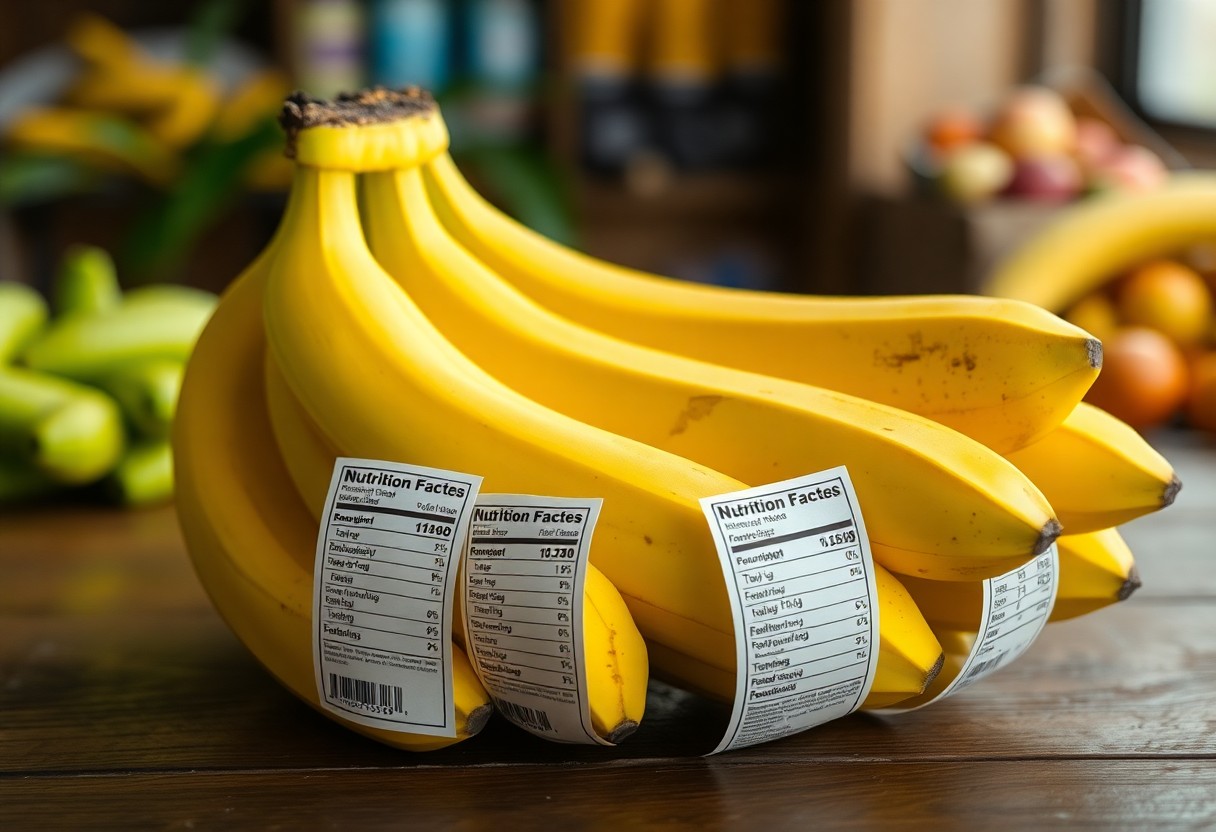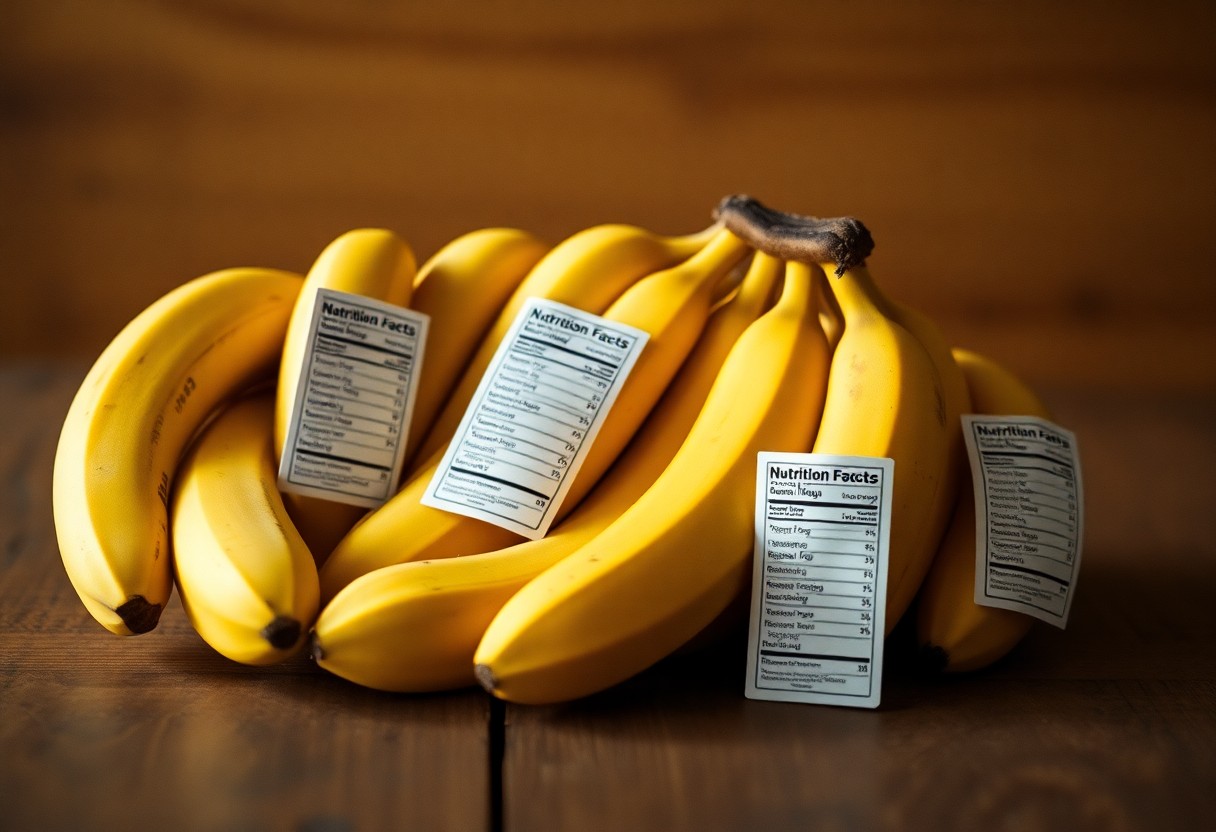You may be surprised to learn just how beneficial bananas can be for your health. Packed with crucial vitamins and minerals, these popular fruits are an excellent source of energy and nutrition. Bananas are rich in potassium, vitamin C, and dietary fiber, making them a fantastic addition to your daily diet. In this blog post, we will explore the nutritional value of bananas and highlight the many reasons you should consider incorporating them into your meals and snacks for optimal well-being.
Nutritional Profile of Bananas
Before including bananas in your diet, it's important to understand their impressive nutritional profile. These fruits are not only delicious but also packed with crucial nutrients that can support your overall health and wellbeing. From keeping your energy levels up to providing key vitamins and minerals, bananas are a great addition to your meal plan.
Macronutrients
For a healthy snack, bananas offer a good balance of macronutrients, making them a smart choice. They typically contain about 27 grams of carbohydrates, primarily from natural sugars and fiber, and only a small amount of protein, averaging around 1-2 grams. With minimal fat content, bananas can be a great fuel source for your workouts or daily activities.
Micronutrients
Macronutrients play an important role in your diet, and bananas also deliver a punch of crucial micronutrients. They are particularly high in potassium, which is vital for heart health and maintaining proper muscle function. Additionally, bananas provide vitamin C, vitamin B6, and small amounts of magnesium and manganese, contributing to your overall nutritional intake.
Plus, these micronutrients offer various health benefits. Potassium aids in regulating blood pressure, while vitamin C supports your immune system and promotes healthy skin. The presence of vitamin B6 helps in brain health and mood regulation, making bananas a truly functional food for your mental and physical wellness. With such a rich micronutrient profile, adding bananas to your daily routine can enhance your nutrition in a tasty way.
Health Benefits of Bananas
Some of the notable health benefits of bananas include improved digestion, enhanced heart health, and better mood regulation. Packed with important vitamins, minerals, and dietary fiber, incorporating bananas into your daily diet can support your overall well-being and promote a healthier lifestyle. Their natural sweetness and portability make them a convenient snack option, offering a burst of energy and nutrition anytime you need it.
Digestive Health
Any digestive discomfort can be eased by including bananas in your diet. They are rich in dietary fiber, which promotes regular bowel movements and helps prevent constipation. The natural enzymes in bananas also support digestion, making them an excellent choice for maintaining a healthy gut.
Heart Health
With their high potassium content, bananas are excellent for maintaining heart health. Potassium plays a vital role in regulating blood pressure, reducing the risk of stroke, and supporting overall cardiovascular function.
Consequently, incorporating bananas into your diet can significantly benefit your heart health. They help balance sodium levels in your body, which can aid in reducing hypertension. Additionally, bananas contain antioxidants and nutrients that support blood vessel health, making them a delicious way to promote a strong and healthy heart. Embracing bananas in your meals and snacks can lead to a beneficial impact on your cardiovascular system, contributing to long-term wellness.
Energy Boost and Exercise
Despite the variety of energy-boosting snacks available, bananas stand out as an excellent choice for enhancing your performance during workouts. Packed with natural sugars, fiber, and important nutrients, they provide a quick energy source to fuel your exercise routine. For more insights on the benefits, check out Are Bananas Good for You?
Pre-Workout Advantage
With their perfect balance of carbohydrates and vitamins, bananas are an ideal pre-workout snack. Consuming one about 30 minutes before exercising can give you that much-needed energy boost, helping to improve your endurance and overall performance.
Post-Workout Recovery
Among the many benefits of bananas, their role in post-workout recovery is particularly noteworthy. They help replenish your glycogen stores and provide important nutrients that aid in muscle recovery.
Consequently, incorporating bananas into your post-workout routine can significantly enhance your recovery. The potassium content helps prevent muscle cramps, while the natural sugars replenish your energy levels quickly. This makes bananas not only a convenient option but also an effective way to support your body’s recovery process after exercising.

Bananas in Diets
Many nutritionists advocate for incorporating bananas into your everyday diet due to their rich nutrient profile. They are an excellent source of energy and provide imperative vitamins and minerals. Check out the Top 5 health benefits of bananas that can enhance your overall well-being.
Weight Management
Around 90% of bananas are composed of water and carbohydrates, making them a low-calorie and satisfying snack option. Their high fiber content helps you feel full longer, which can aid in weight loss. Incorporating bananas into your meals can lead to healthier choices while keeping cravings at bay.
Meal Ideas and Recipes
Recipes featuring bananas are both versatile and simple, making it easy for you to enjoy their benefits. You can add them to smoothies, oatmeal, or yogurt for a nutritious breakfast or snack. Baking with bananas, like in muffins or bread, provides moisture and natural sweetness without excess sugar.
Another great way to include bananas in your diet is to pair them with nut butter for a quick energy boost or blend them into pancakes for a delicious treat. Create banana-based desserts like banana ice cream or chia pudding to satisfy your sweet tooth while enjoying the nutritional benefits.
Environmental Impact of Banana Production
Once again, bananas are not just a delicious snack; their production can have significant impacts on the environment. The banana industry often leads to deforestation, loss of biodiversity, and soil degradation due to extensive monoculture practices. Additionally, the heavy use of pesticides and fertilizers can contaminate local water sources and harm wildlife. Understanding these challenges can help you make more informed choices about the bananas you consume and their overall footprint.
Sustainable Farming Practices
Impact in banana production is increasingly moving towards sustainable farming practices that prioritize environmental health. These practices include crop rotation, organic farming methods, and reduced use of harmful chemicals. By supporting farms that implement such methods, you can contribute to a healthier ecosystem while enjoying your favorite fruit.
Economic Importance
The banana industry plays a vital role in the economy of many countries. As one of the most traded fruits globally, bananas create jobs and foster economic development in both producing and exporting nations. Their affordability and availability have made them a staple in households worldwide.
Also, the economic importance of bananas extends beyond immediate job creation. They support various sectors, including agriculture, transportation, and trade. By engaging in the banana economy, you help sustain livelihoods for millions of farmers and workers, boosting rural economies and fostering development in regions that rely heavily on banana production. Your choices can influence these dynamics and promote positive change in global communities.

Common Myths About Bananas
For many, bananas are often surrounded by misconceptions that can deter you from enjoying this nutritious fruit. These myths can lead to misunderstandings regarding their health benefits and overall consumption. It’s necessary to debunk these common myths to appreciate the true value of bananas in your diet.
Sugar Content Myths
One prevalent myth is that bananas are too high in sugar to be a healthy snack. In reality, while bananas do contain natural sugars, they also provide necessary vitamins and minerals, as well as dietary fiber, which contribute to a balanced diet. Their sugar content is balanced by these health benefits, making them a suitable choice for most individuals.
Allergies and Intolerances
By contrast, many people believe bananas are a common allergen, which is often overstated. Although some individuals can experience allergic reactions, these cases are rare compared to other fruits or food items.
Myths surrounding banana allergies can create unnecessary fear. If you have concerns about food allergies, it is always wise to consult with a healthcare professional. Most people can safely enjoy bananas without fear of allergies. In fact, bananas can be a great addition to your diet, providing numerous health benefits without causing adverse reactions for the vast majority of people.
Conclusion
Drawing together the diverse benefits of bananas, you can enhance your health by incorporating them into your diet. Rich in important vitamins, minerals, and fiber, bananas support heart health, digestive wellness, and energy levels. Their convenience and natural sweetness make them a perfect snack for any time of day. By choosing bananas, you not only enjoy a delicious fruit but also contribute to your overall nutrition and well-being.
FAQ
Q: What are the key nutritional components of bananas?
A: Bananas are rich in several important nutrients. They are an excellent source of potassium, providing about 400-450 mg per medium banana, which supports heart health and regulates blood pressure. Additionally, bananas contain vitamin C, vitamin B6, dietary fiber, and various antioxidants, which contribute to overall health and well-being.
Q: How can bananas boost energy levels?
A: Bananas are a great source of carbohydrates, primarily in the form of natural sugars like glucose, fructose, and sucrose. These carbohydrates provide a quick source of energy, making bananas an ideal snack before or after exercise. The potassium content also helps in muscle function, reducing cramps and fatigue during physical activity.
Q: Are there any benefits of eating bananas for digestion?
A: Yes, bananas are high in dietary fiber, particularly pectin and resistant starch. These types of fiber promote healthy digestion by adding bulk to the stool and facilitating smooth bowel movements. This can help prevent constipation and support a balanced gut microbiome, contributing to digestive health overall.
Q: How can bananas support heart health?
A: The potassium in bananas plays an important role in maintaining heart health. It helps regulate blood pressure by balancing sodium levels in the body. Additionally, the fiber content can assist in lowering cholesterol levels, reducing the risk of cardiovascular diseases. Regular consumption of bananas may contribute to a healthier heart over time.
Q: Can eating bananas help with weight management?
A: Bananas can be a beneficial food for weight management due to their high fiber content, which promotes a feeling of fullness and may reduce overall calorie intake. Their natural sweetness can also satisfy cravings for sugary snacks, making them a healthier option. However, portion control is key, as bananas do contain calories, so including them as part of a balanced diet is advisable.

0 Comments